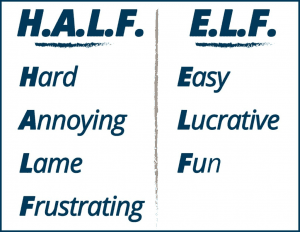By Brittany Anderson
In the realm of business there are many different sayings out there to describe success vs. lack of success. You’ve got terms like proactive vs. reactive… embrace change vs. fear change…accountability vs. blame…transparency vs. secretive – and the list goes on. One of the most interesting descriptions we have heard in regards to describing a business came from Joe Polish, founder of Genius Network. He used the terms HALF and ELF to describe two different types of businesses. We will explain in detail what this means below.

Taking both of these descriptions into consideration which one seems more appealing? That’s a pretty easy choice right? Sometimes choosing between these two types of business is much easier than making the obvious choice, the ELF business, a reality. There are many business owners out there that feel stuck in the whirlwind and no matter how hard they try, they are drowning in their business. An easy, lucrative and fun business is nothing but a distant wish because they are so consumed with working in their business that they have no time to work on their business. This is why we’ve developed 5 key suggestions for taking your company from HALF to ELF.
1. Define What HALF vs. ELF Means for Your Business
What about your business is hard, annoying, lame and frustrating? Make a list of all the items that fit that description then write down the key first steps to improving those. Maybe you find yourself doing a task that you feel you shouldn’t be wasting your time on? Delegate that item to someone on your team that is better suited for it, and if you don’t have a team of employees look at one of the many different outsource options. Websites like lessdoing.com and fivver.com are great options for getting just about anything done at a minimal cost. On the flip side what are the things that you enjoy doing within your company? What are the things that give you the most energy and excitement? The items you have the most passion for? Those are the areas you should be spending the majority of your time. Figure out how to minimize or eliminate the HALF items and spend more time on the ELF items.
2. Use the HALF vs. ELF Concept in Your Decision Making
One of the biggest improvements we’ve seen in our office when considering the HALF vs. ELF concept is it has made decision making a lot easier. If the project, task or idea on the table will not move us towards our definition of an ELF company, then it is tossed out the window. For many business owners and entrepreneurs there are very few ideas that they don’t like. The process of elimination or prioritization becomes much easier when you decide where you enjoy spending your time and energy vs. what is going to cause pain and frustration.
3. Do Not Start a New Endeavor Before Doing a HALF vs. ELF Analysis
In the case of the serial entrepreneur it is easy to get really excited about a new opportunity. Maybe it looks awesome from the outside but if you take the time to do the HALF vs. ELF analysis you may realize there is more pain than gain. When you are clear on your definition of what constitutes a business that is easy, lucrative and fun, when something falls outside of that description it becomes glaringly obvious. And don’t get caught up in just one of the 3 ELF descriptions. Just because something might be fun it may not be easy or lucrative. And just because a new venture is easy, doesn’t mean it will be fun or lucrative in the end. You get the picture.
4. Think About Your Client Base in the HALF vs. ELF Comparison
Time and time again we have heard from business owners that their business would be amazing with the exception of a handful of very difficult clients. One of the hardest decision a business owner can make, regardless of the industry they are in, is to disengage a client. In the short-sighted view this can mean a loss of revenue, loss of a long-time relationship and an uncomfortable conversation/situation to be in. When you take a step back and look at the long-term effects what this really means is time freed up to work with the clients and prospects that give you energy, which can lead to an increase in revenue, stronger relationships and an unnecessary weight off your shoulders. Maintaining a relationship with a client, employee or anyone for that matter that makes your life hard, annoying, lame and frustrating is a waste of time and energy. There are plenty of awesome people out there ready to exchange the ELF tendencies to make both of your experiences easy, lucrative and fun!
5. Extend the HALF vs. ELF Concept Into Every Aspect of Your Life
So far we have talked primarily about HALF vs. ELF in regards to your business, but the biggest impact this analogy can have is by applying it in your everyday life. Our time is limited. We have 86,400 seconds in a day and wasting even one of those is a tragedy when trying to live a fulfilled life. When you’re deciding how to spend your precious free time, think about what items are HALF and what qualifies as ELF? Business owners and entrepreneurs alike tend to have so many demands on their time that when it comes to choosing where your time is best spent it feels like the only solution is sacrificing one thing for another. When you use the HALF vs. ELF concept however, those sacrifices turn into conscious decisions that you can be at peace with, because you know exactly what deserves your attention and what does not. Applying this concept to your business and personal life will make you more self-aware, more fun to be around and a much more balanced individual.
Sweet Financial Partners, LLC (hereinafter referred to as “Sweet Financial”) is a registered investment adviser and is not affiliated with Genius Network or Joe Polish. The information provided within this blog post regarding the HALF vs. ELF Companies concept is sourced from publicly available information and is provided solely for educational and illustrative purposes. Any mention of Genius Network or Joe Polish does not constitute an endorsement by Sweet Financial, nor does it signify any form of partnership or collaboration between Sweet Financial and Genius Network.
This commentary on this website reflects the personal opinions, viewpoints and analyses of the Sweet Financial Partners, LLC employees providing such comments, and should not be regarded as a description of advisory services provided by Sweet Financial Partners, LLC or performance returns of any Sweet Financial Partners, LLC client. The views reflected in the commentary are subject to change at any time without notice. Nothing on this website constitutes investment advice, performance data or any recommendation that any particular security, portfolio of securities, transaction or investment strategy is suitable for any specific person. Any mention of a particular security and related performance data is not a recommendation to buy or sell that security. Sweet Financial Partners, LLC manages its clients’ accounts using a variety of investment techniques and strategies, which are not necessarily discussed in the commentary. Investments in securities involve the risk of loss. Past performance is no guarantee of future results.

